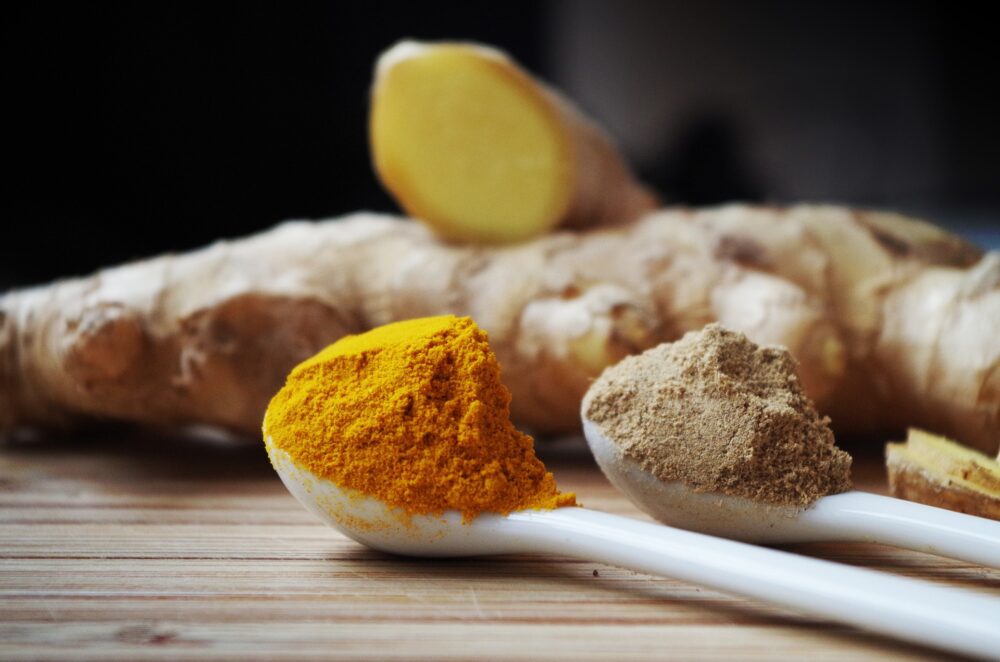When my 81-year-old grandmother first told me she was taking turmeric to help her arthritis, I was skeptical. To me, turmeric was the orange spice that sometimes came out of the cabinet when curry was on the menu. Was my grandmother’s venture into the spice world for medicinal solutions based in fact? She reassured me that she had been prescribed turmeric pills by her physician, and that there is research to support the use of turmeric to treat inflammatory disorders such as joint arthritis.
Turmeric contains a molecule called curcumin, which soothes arthritis because of its anti-inflammatory properties. In the immune system, protein NF-κB regulates protein TNF-α, which induces inflammation, among other immune responses. Substances that activate NF-κB, such as cigarette smoke, viruses, and stress, have been shown to increase inflammation; likewise, substances that downactivate NF-κB have been shown to decrease inflammation. A study by Biomedicine and Pharmacotherapy showed that, when taken in a daily dose of one gram, curcumin blocks NF-κB activation, therefore reducing TNF-α production and, subsequently, inflammation. Many other spices, such as ginger, red pepper, and garlic, also have anti-inflammatory properties.
Was my grandmother’s venture into the spice world for medicinal solutions based in fact?
So, my grandmother’s turmeric prescription is backed by science. But what about other spices? Curcumin is in a category of organic compounds called polyphenols. Many plant-based foods, including other spices, have high concentrations of polyphenols. Studies strongly suggest that long-term consumption of these foods can help prevent cancer, diabetes, and other diseases because of the antioxidant properties of the polyphenols. For example, a study by Richard Anderson of the United States Department of Agriculture tested the effect of cinnamon on subjects with type 2 diabetes, a disease that causes high blood sugar. The study found that taking cinnamon capsules for 40 days lowered the fasting blood sugar in the test subjects by up to 29 percent. This occurred because cinnamon polyphenols activate insulin receptors and increase the number of those receptors in the blood, leading to more efficient blood sugar transportation.
Along with providing solutions to common diseases, some spices can work together to enhance their own effects. Black pepper consists of five to nine percent piperine, the organic compound that gives the spice its signature pungent smell. Piperine increases the absorption of other nutrients by inhibiting liver glucuronidation — a process that makes molecules more water-soluble — which allows the liver to expel substances through urine. Combining pepper with other spices, such as turmeric, can significantly increase the absorption of the beneficial compounds provided by those spices. A study published in Planta Medica found that levels of curcumin were very low in subjects who solely consumed two grams of curcumin, but subjects who also consumed 20 milligrams of piperine had much higher concentrations of curcumin in their blood.
Turmeric contains a molecule called curcumin, which soothes arthritis because of its anti-inflammatory properties.
Turmeric, black pepper, and cinnamon can be useful to individuals suffering from specific maladies. However, spices can help with simple health problems too. Ginger root has been used for thousands of years to treat a variety of ailments, and has recently become a common solution to stomach problems. Consuming one gram of ginger root per day has been shown to decrease nausea and vomiting in pregnant women. This occurs because ginger root acts within the gastrointestinal tract to block serotonin receptors. While serotonin is known as the “happiness molecule,” its purpose in the digestive system is to make the gut contract around food. When there is too much serotonin in the gut, food can be digested too quickly, causing feelings of nausea or an “upset stomach.” Ginger root helps to stop excess serotonin by inhibiting the action at serotonin receptors, therefore preventing the adverse effects of excess serotonin on the digestive system.
Spices have been used for medicinal purposes for generations all around the world, but only recently has the research developed to support the discoveries of the past. Turmeric, cinnamon, pepper, and ginger are just a few of the many spices that contain chemicals that can help address our ailments. So the next time you open the spice cabinet, not only are you helping your taste buds, but the rest of your body as well.
Sources:
Journal of AOAC International (2019) 10.5740/jaoacint.18-0418
Foods (2017). DOI: 10.3390/foods6100092
Biomedicine and Pharmacotherapy (2016). DOI: 10.1016/j.biopha.2016.05.037
Proceedings of the Nutrition Society (2008). DOI: 10.1017/S0029665108006010
Oxidative Medicine and Cellular Longevity (2009). DOI: 10.4161/oxim.2.5.9498
Planta Medica (1998). DOI: 10.1055/s-2006-957450 Integrative Medicine Insights (2016). DOI: 10.4137/IMI.S36273






